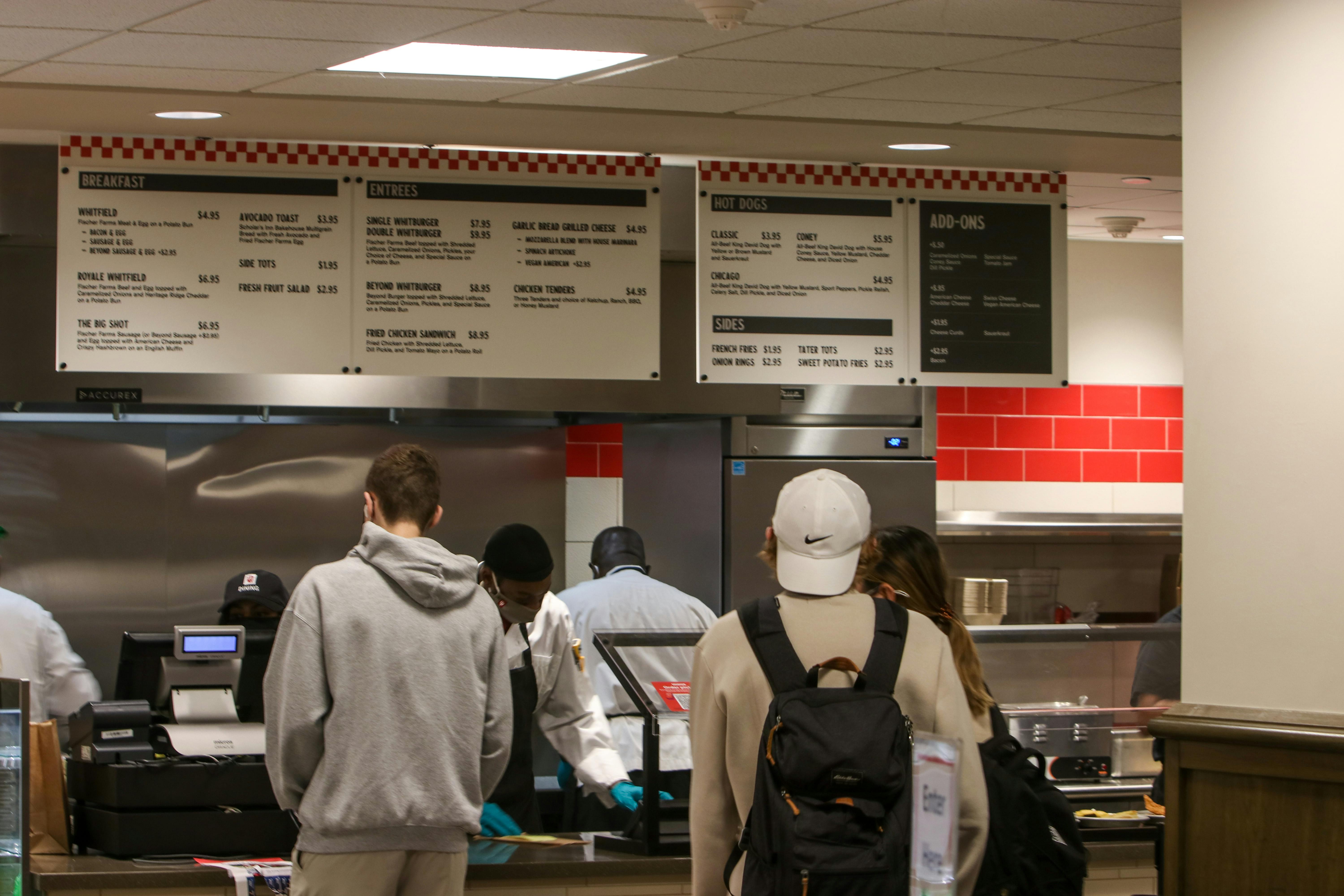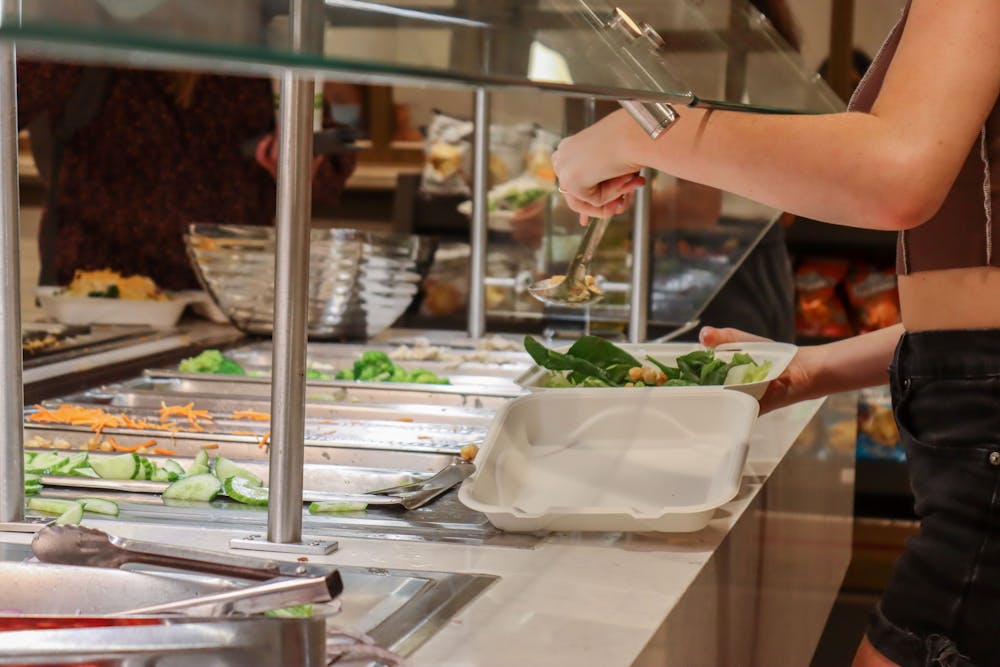With an increase of complaints about IU Dining’s food quality, many students feel frustrated, left out and hungry.
A former faculty member, a current employee and a student spoke to the Indiana Daily Student about management issues in IU Dining, cross-contamination between menu items and allergen misinformation.
Corinne Nicholson is a former assistant manager who worked at IU Dining for 38 years. She said she used to be proud of the menu items she served, but after declining food quality and management issues, the food had never been this bad.
Nicholson said she wouldn’t eat the food she provided for thousands of students at the dining halls by the end of her tenure.
She said mismanagement and poor food quality led her to retire early in April 2021.
“I could not in good conscience serve the food to students,” Nicholson said. “I just thought it was horrible.”
The IDS requested an interview four times with IU Dining leadership. Requests were denied, and the IDS was referred to IU spokesperson Chuck Carney.
“Food quality is a matter we take very seriously and if a student has a concern, they should immediately alert dining facility staff. We will take action to address the issue,” Carney said in a statement to the IDS.

Food Quality
Nicholson said food quality took a turn for the worst after a management change, allegedly resulting in overall lower food quality. She said this is largely due to alleged mismanagement from IU Dining leadership.
“I was so ashamed by the time I left to serve anybody that food,” Nicholson said. “I was terrified that the food that I was giving, somebody was going to get sick, somebody was going to die from allergies.”
Nicholson said IU Dining management had some good ideas, but then began approaching the preparation of food from a catering perspective rather than a way that feeds thousands of students on a daily basis. She said this included staff not routinely checking food temperatures.
Due to the pandemic, Nicholson said the catering staff had no events to cater, so many of the catering chefs were moved into food preparation facilities. The catering chefs didn’t understand the process of making food for thousands of students each day, she alleged.
“I understand it was a very difficult time of the pandemic, but the food was just atrocious,” Nicholson said.
Nicholson said she took her concerns with the food directly to dining leadership, only to have them turned down. She said she told leadership she knew what good food looked like — not like IU Dining’s product.
“What I was told was, I just didn’t understand the new and exciting foods chefs were putting out,” she said.
This year, students and parents made their frustrations known about food quality, with many sharing photos online or in Facebook groups showing similar features to what Nicholson shared with the IDS.
The Indiana University Class of 2025 - Parents Facebook group flooded with complaints of students getting sick after eating some of the dining hall food, prompting questions about preparation. Some questions were fielded during a Sept. 8 IU Dining webinar about the challenges of returning to full service on campus, food available and special diet information.

Allergen Misinformation
IU Sophomore Katie Hamann is allergic to soy, sesame nuts and tree nuts. She said she has had issues with allergen information discrepancies between Grubhub and Net Nutrition, a service IU uses to list allergen and ingredient information, specifically about products containing soy.
“I feel like even for people without allergies, it should be concerning that they can’t definitively tell you what’s in the food they were feeding you,” Hamann said.
Net Nutrition labeled a cinnamon roll served in the Indiana Memorial Union’s Sugar and Spice as containing soy, indicating it should be avoided by those with allergies. The store is no longer listed on Grubhub, but Hamann said Grubhub did not have the same warning. If a student only relied on Grubhub’s allergy descriptions, Hamann said they would be susceptible to an allergic reaction.
Hamann said she encountered multiple instances of these discrepancies at various IU dining locations.
“The information is just really bad, and it’s a really dangerous situation for people with allergies,” Hamann said. “It is really stressful to eat there.”
Hamann said her throat will tighten up if she eats an item with soy, sesame nuts or tree nuts in it. She usually takes benadryl to help ease the swelling, but she has an EpiPen if she were to have a more severe reaction.
Hamann said she has had at least three mild reactions since her freshman year to IU Dining food and believes it to be either cross-contamination or mislabeling issues in the dining halls. For students with more severe reactions, Hamann said, this is a serious concern with IU Dining.
“It’s unfortunate because I paid for a meal plan,” Hamann said. “I am just limited in how many things I can actually use it with.”
Nicholson said she noticed last semester how some allergens were cross-contaminated with other menu items, endangering students with allergies. This allegedly included foods like peanut butter cookies mixed with vegan and gluten-free cookies, and vegan sausage patties touching meat-based patties at Hodge Hall’s Hodge Cafe.
Nicholson said there has not been enough due diligence to ensure proper storage and preparation of foods potentially causing allergic reactions in certain students. She said it is such an easy fix to make sure the foods aren’t stored together or placed on the same tray, and it seems no one has taken any steps toward remedying the issue.
Hamann said she brought similar issues with IU Dining and was told what was safe to eat, but students should not have to meet with chefs or dining hall coordinators to find out truthful allergen information.
It was suggested Hamann ask for her food to be specially made, but she said the dining halls have been so busy it is difficult to have them make something different.
“It’s not actually a realistic option to ask them to make you completely separate foods,” Hamann said.
Hamann said she feels unheard and unseen by IU Dining. With an inability to rely on IU Dining, Hamann has turned to cooking for herself, although she has struggled living in a residence hall and cooking with products available in C-Stores.

Management Issues
Nicholson alleged the management style became difficult to work for, and an executive allegedly made students cry and told employees they had no skills.
Several employees quit out of frustration due to the emotional mistreatment, she alleges. Those like her, who could not stand the workplace environment, finally left, Nicholson said.
Lydia Stern, IU senior and barista at the IMU Starbucks, said many workers, like Hamann, feel unheard and unseen by IU Dining leadership.
“We see better opportunities, better solutions,” Stern said. “No one does anything to address those, which would make not only our lives easier but definitely the students' lives.”
She said many employees are overworked due to understaffing — another factor leading to poor quality of food.
Stern said many have quit because of the issues surrounding the stressful work environment.
“A lot of people are just quitting because they're being overworked, or the amount of stress is not worth the $10.40 an hour,” Stern said.
Stern said she hopes people understand the issue is not with the workers.
“I feel like people think we’re the ones who are slacking, but it is just the system,” Stern said.
Stern said she often stayed later to help with cleanup or picked up extra hours on shifts because restaurants are so understaffed. She said there seems to be no sense of urgency from leadership to hire more workers, even though the current staff is struggling to keep up with demand.
“If I don't do it, no one's gonna do it because there isn't enough people to do it.




